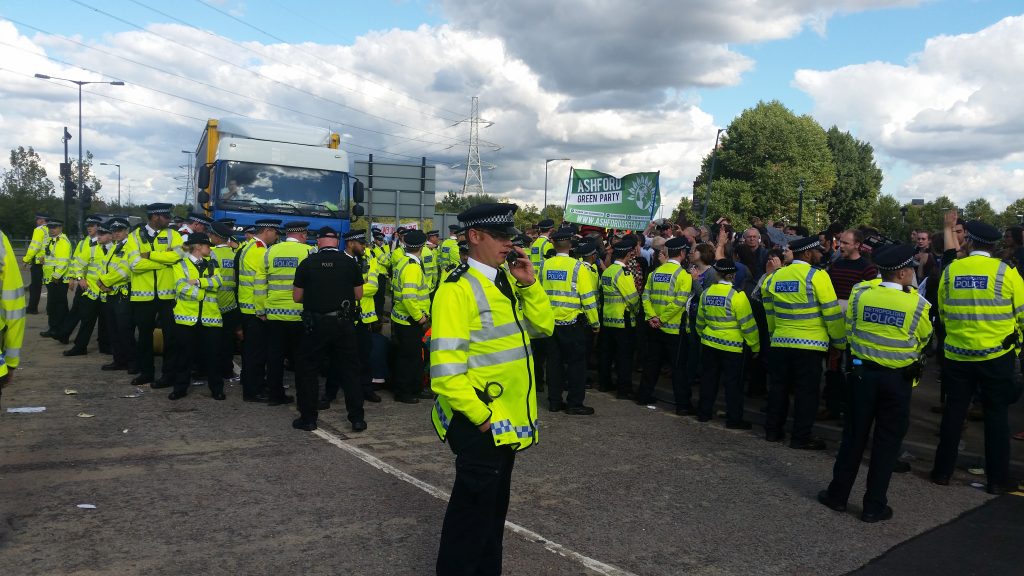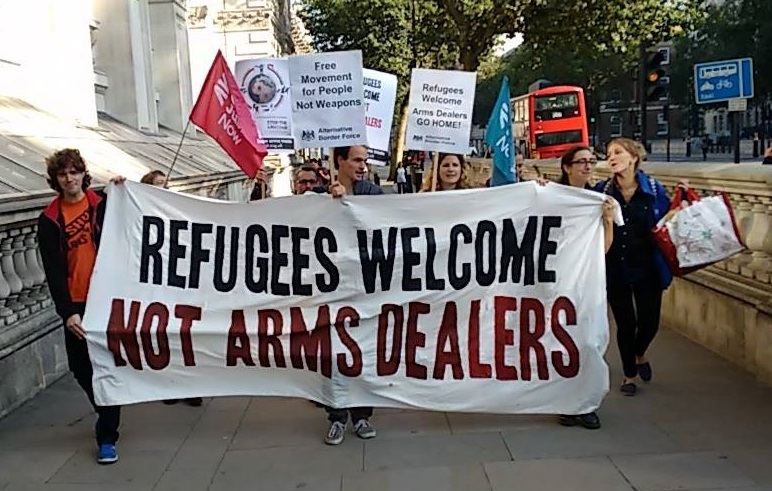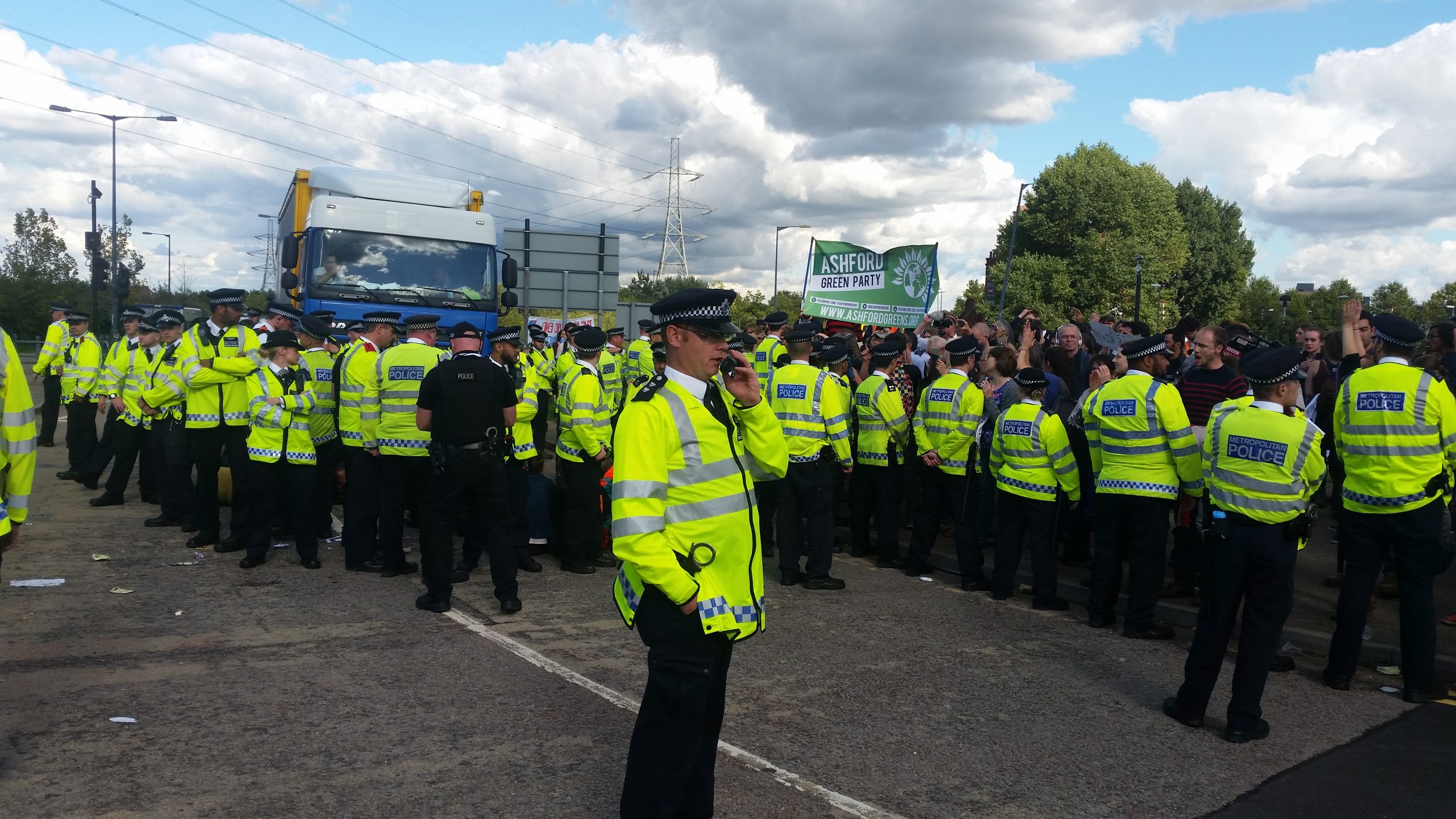Since the terrorist attacks in Paris, the French government has declared a national state of emergency; giving exceptional powers to security services and police. This is being used to suppress dissent and civil disobedience during the UN climate talks which started yesterday. Big events such as Christmas markets and football matches have been allowed to go ahead, but all protests and marches have been banned. Squats have been raided, activists have been placed under house arrest and have had possessions seized.

Meanwhile in the UK, David Cameron has announced that 10,000 troops are ready to go on the streets should a similar attack take place in London. He has also announced plans to increase investment in counter-terrorism police, and tomorrow MPs will be voting on whether to bomb Syria.
The UK and France’s responses to the attacks reflect and accelerate the growing militarisation of policing and the use of ‘counter-terrorism’ to justify increased military spending and a clamp down on civil liberties (which some have likened to the US’s response following 9/11). The lines between policing, the army and ‘security’ are becoming blurred and militarisation is becoming the default response to humanitarian and environmental disasters.
As refugees flee from bombs dropped or sold by Western governments, they are met by security fences and detention centres. Arms fairs and events expose this encroaching militarisation: The same British company that organises the DSEI arms fair that took place in London this September, also organises the ‘Border Security Expo‘ and the ‘Counter-Terror Expo‘ (as well as a whole host of major oil and gas events).
The UK’s ‘Border Force’ will have its own zone at the Security and Policing fair in Farnborough next year. It markets itself as playing “a pivotal role in the fight against terrorism, organised crime and illegal migration, exploiting the unique point of intervention presented by the UK border […] and is increasingly recognised as a key player in the national security agenda”. But many have argued that, far from countering terrorism, heavy policing of borders plays into the hands of ISIS’s strategy to maintain legitimacy and maximise the population within the territory they currently control.

Since the Paris attacks, France, the US and Russia continue to bomb Syria and John Kerry has said that the US “is seeking new military, counter-terrorism and diplomatic ideas to destroy Isis faster”. MPs will be voting on intervention tomorrow, but British bombs will not solve the Syria crisis. War and terror drive the arms industry. Chemring (whose tear gas was used against protesters in Hong Kong and Egypt) stated that it is “well-positioned to benefit from any sustained increase in demand as a result of the conflict in the Middle East”. It is no coincidence that there was a rise in arms company stock prices immediately after the Paris attacks.
The military actions of Western nations recruit more people to the cause than they kill. Every bomb dropped is a recruitment poster for ISIS, a rallying point for the young, vulnerable and alienated. And every bomb dropped on Syrian cities drives yet more people to flee and seek refuge in safer countries.
British Quakers’ statement after the Paris attacks
While President Hollande bans social and environmental justice protests, he will be welcoming the very companies and governments fuelling conflict and repression for one of the world’s largest arms fairs in Paris next June.
But while our governments turn to increased militarisation and a security agenda that benefits arms companies, a growing number of people are challenging this and standing up for their rights. Thousands of people have already defied the French protest ban by taking action this weekend (some of whom were met with tear gas and pepper spray). And many more are still planning to travel to Paris for the UN climate talks protests.
Despite the ban on protest in Paris, we will be there to raise our voices against war, racism and pollution profiteering. We stand in solidarity with the countless victims of recent violence in Paris, Beirut, and Mali, as well as their families and loved ones.
As part of a global climate justice movement, we oppose the bombing of Syria. Over many decades we have witnessed that Western militarism has only increased the instability of the Middle East and other regions. This militarism abroad has also escalated the military complex at home in the United States, where communities resisting the industries causing climate change, have been heavily policed and targeted by police violence.
It Takes Roots to Weather a Storm: statement by a delegation of frontline leaders from Indigenous, Black, Latino, Asian and working class white communities in the US and Canada
An African gender and extractives alliance has also made the links between militarism, climate change, policing and racism:
African women have engaged in uninterrupted, but often invisible and unrecognised resistance against the dispossessions and encroachments upon their lands and natural resources. African women have resisted war and often led movements for peace.
The recent terror attacks in Paris, Beirut, Baghdad, and Bamako are a response to deepening systemic crises African women have been contesting. The struggle against an oppressive development paradigm is, at one and the same time, also a fight against terrorism, militarisation, racism and war.
WoMin: An African Ecofeminist Perspective on the Paris Climate Negotiations
Nick Buxton and Ben Hayes’ new book The Secure and the Dispossessed: How the military and the corporations are shaping a climate-changed world lays out the opportunities corporates and military elites see in climate change, but also the communities resisting: “For [corporate and military leaders], melting ice caps mean newly accessible fossil fuels, borders to be secured from ‘climate refugees’, social conflicts to be managed, and more failed states in which to intervene.“

